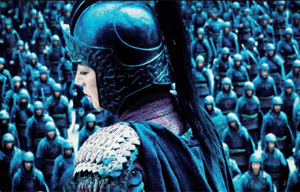Business execs brush off global mantle
Updated: 2011-10-25 10:36
By Cheng Guangjin (China Daily)
|
|||||||||
NEW YORK - Chinese business executives at a recent summit in New York City toed the line often used by the central government in describing their roles on the global stage: Help drive the world's economy without taking a leadership role in it.
Several Chinese panelists at the summit titled "Leading the Next Decade: New Dynamics in US-China Business Relations", which was attended by Chinese and US business executives, said China's rise is simply to provide solutions for the global economy.
The eighth annual summit, co-hosted by the China Institute in America, a nonprofit educational and cultural institution in New York City, and the Cheung Kong Graduate School of Business, a leading Chinese business school based in Beijing, allowed several Chinese executives such as Wang Yi'e, general manager of Beijing Foreign Enterprise Human Resources Service Co (FESCO), to make the case that China needs to take care of its own issues before it addresses global problems.
FESCO is the first company in China to provide services in human resources for foreign enterprises, foreign financial institutions and economic organizations in China.
"Managing domestic things well is China's biggest contribution to the world," Wang said. "China's top priority should be improving population quality. A well-educated Chinese population contributes to both the progress of Chinese society and world civilization."
Wang's view is commonly held among leadership in China's central government. Last September, Premier Wen Jiabao stressed in an interview in New York City that China's problems as a developing country hinders the nation from taking a global leadership role.
Wendell L. Willkie, senior vice-president of MeadWestvaco, a global leader in packaging solutions, said that many in Western countries incorrectly see a threat in China, explaining that they should also see the magnitude of the challenges China faces.
He said that a US Senate bill that would punish Beijing for allegedly manipulating its currency is "a misguided attempt to exercise hard power" between two nations that "are closely bound together".
China condemned the US shortly after the bill was passed on Oct 11, warning that the proposed legislation, if passed into law, will trigger a trade war.
Huang Yasheng, a Sloan School of Management professor at the Massachusetts Institute of Technology, said trying to tell Americans that the benefits in China's rise overshadow the dangers is a big "psychological problem".
Huang cited a survey in which many Americans believe China is the dominant power in the world because "Made in China" products are ubiquitous.
Huang said Chinese workers actually earn little in their manufacturing jobs for foreign companies.
Gregory B. Craig, partner of litigation at Skadden, Arps, Slate, Meagher & Flom LLP, said China's economic growth is reassurance that its rise is not something to be feared.
The firm established its office in Beijing in 1991 to advise Chinese clients in merger and acquisitions and foreign clients on investment or acquisition projects in China.
"Because of its economic growth, because China is investing in the US, because China depends upon the world economic thriving, China becomes a much more status quo power than a revolutionary power," Craig said.
China Daily










